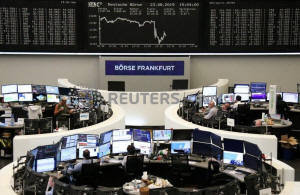Global stocks edge higher as Trump acts to ease China trade tensions
 Send a link to a friend
Send a link to a friend
 [August 26, 2019]
By Tommy Wilkes and Dhara Ranasinghe [August 26, 2019]
By Tommy Wilkes and Dhara Ranasinghe
LONDON (Reuters) - Stock markets clawed
themselves off their lows on Monday but sentiment remained fragile after
the latest flare-up in the U.S.-China trade war sent investors
scrambling into government bonds and battered emerging market
currencies.
European equity markets had looked set to follow their Asian
counterparts deep into the red but recovered when U.S. President Donald
Trump said China had contacted Washington overnight to say it wanted to
return to the negotiating table. Beijing called for calm.
Speaking on the sidelines of a summit of major industrialized nations in
France, Trump hailed Chinese President Xi Jinping as a great leader and
said he welcomed his desire for a trade deal and for calm - soothing
investors' nerves after a round of more tariffs were abruptly announced
on Friday.
Wall Street futures turned positive and were last up 0.5%.

European stock markets struggled to bounce to the same degree, with the
pan-European Eurostoxx down marginally on the day. Germany's DAX rose
0.29% while France's managed a 0.48% rise. London's markets were closed
for a holiday.
Stocks had fallen sharply in Asia before Trump spoke as investors
panicked that the latest tit-for-tat tariffs would damage global growth.
On Friday, Trump announced an additional duty on some $550 billion of
targeted Chinese goods, hours after China unveiled retaliatory tariffs
on $75 billion worth of U.S. goods.
The MSCI world equity index, which tracks shares in 47 countries,
remained 0.31% lower by 1000 GMT.
"Trump is clearly potentially exposed to a slower U.S. economy impacting
his capability to be re-elected. He is aware of this and so reacts to
market volatility with some kinder words," said Chris Bailey, European
strategist at Raymond James.
"The Chinese have seen him blink and have filed this away for use later.
Shorter-term I think this is the basis of some tentative deal," he
added.
Despite the more positive tone in stock markets, assets deemed safe
havens remained well supported. The 10-year U.S. Treasury bond yield hit
a new 3-year low at 1.449% before rising to 1.52% - still a touch lower
on the day.
It is down some 50 basis points so far this month.
The price of gold, which has boomed in recent months as nervous
investors flocked to the precious metal, touched its highest since April
2013 and was last up 0.3% at $1,530.
Germany Bund yields did reverse their earlier falls. The 10-year bond
rose 2 basis points to -0.657%, having earlier dropped to as low as
-0.70%.
YUAN HITS 11-YEAR LOW
Emerging market currencies were among the biggest casualties of the
latest trade war-induced volatility.
[to top of second column]
|

The German share price index DAX graph is pictured at the stock
exchange in Frankfurt, Germany, August 23, 2019. REUTERS/Staff

China's yuan plunged to an 11-year low in the onshore market and hit
a record low in offshore trading. It later recovered somewhat in the
offshore market but remained 0.2% lower at 7.1535 yuan per dollar.
Turkey's lira weakened around 1% to more than 5.8 against the dollar
on Monday after briefly plunging to 6.47 in what market watchers
described as a "flash crash" as Japanese investors slashed their
exposure to riskier assets.
The lira was last down 1.1% at 5.8185.
Elsewhere in currency markets, the safe-haven Japanese yen rallied
to a new seven-month high of 104.46 yen per dollar before reversing
those gains to trade down 0.6% at 105.93 as some calm returned to
markets.
The dollar rose broadly and was up 0.3% versus the euro at $1.1112.
As investors try to navigate the year-long trade conflict between
the world's two biggest economies, some are choosing to cut their
exposure to stocks believing the battle is taking its toll on global
growth.
"Downside risks are increasing for both the global economy and
markets," said Mark Haefele, global chief investment officer at UBS.
"As a result, we are reducing risk in our portfolios by moving to an
underweight in equities to lower our exposure to political
uncertainty."
German business sentiment deteriorated more than expected in August
to hit its lowest since November 2012, a survey by Germany's Ifo
Institute showed on Monday.

The latest trade escalation overshadowed a pledge by Federal Reserve
Chair Jerome Powell last week to "act as appropriate" to keep the
U.S. economy healthy, although he stopped short of committing to
rapid-fire rate cuts.
The markets clearly believe the Fed will have to act more
aggressively and are fully priced for at least a quarter-point cut
in September and more than 120 basis points of easing by the end of
2020.
Oil prices, which had earlier fallen on concerns the tariff dispute
would crimp world demand, recovered in European trading. [O/R]
Brent crude futures rose 1.18% to $60.04, while U.S. crude gained
1.26% to $54.85 a barrel.
(Additional reporting by Wayne Cole in Sydney; Editing by Mark
Heinrich)
[© 2019 Thomson Reuters. All rights
reserved.]
Copyright 2019 Reuters. All rights reserved. This material may not be published,
broadcast, rewritten or redistributed.
Thompson Reuters is solely responsible for this content. |